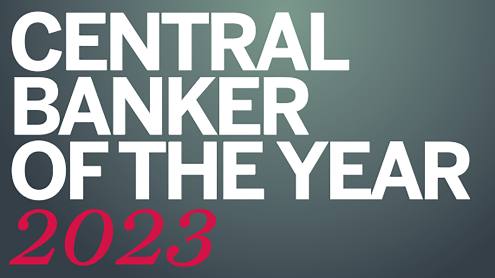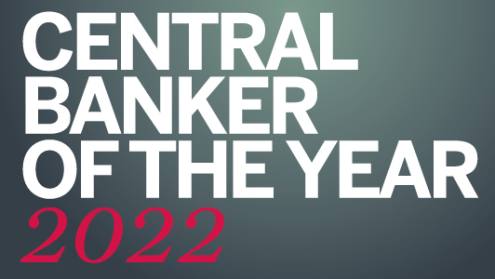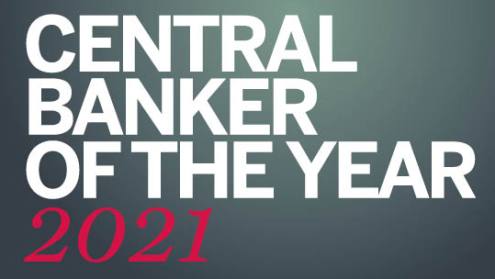Central Banker of the Year - Global and Europe.
Jean-Claude Trichet - President, European Central Bank
The dexterous handling of the credit seizure that struck the markets last August and the ability of the European Central Bank (ECB) to recognise early its implications has gained Jean-Claude Trichet the recognition of Central Bank Governor of the Year.
The containment of inflation has been one of the ECB's key targets, more so with the enlargement of the EU's economic area. At the first signs of a credit crisis, however, Mr Trichet promptly abandoned its previous plan to raise rates in September and injected liquidity in the eurozone. This was the optimal response given the circumstances.
An engineer by training, Mr Trichet joined the ECB in 2003 as its president. During his career he also covered the roles of head of the central bank of France for two terms, was governor of the World Bank and the International Monetary Fund and a member of the board of the International Bank of Settlements and of the ECB.
Mr Trichet's flexibility should be praised also in consideration of the central banker's hawkish approach to interest rates. Considered by some as a true optimist, Mr Trichet was convinced of Europe's strong growth in 2005, when, despite widespread scepticism, he started to raise interest rates.
His judgement was vindicated and during the past year the central governor has reaffirmed his faith in the eurozone's prospects - although a strong euro and higher-than-expected inflation might be accompanied by ongoing market turbulence, which would further complicate interest rates decisions.
To contain the effects of the market seizure, the ECB has also put in place measures to prevent a year-end funding crisis caused by the uninterrupted wave of banks' write-downs and by the ongoing tensions of the credit markets.
Central Banker of the Year - Americas.
Henrique Meirelles - Governor, Central Bank of Brazil
Under Henrique Meirelles, the Central Bank of Brazil has emerged as a model of restraint and prudence in Latin America. Facing a welcome boom in inflows of direct and portfolio investment and domestic demand, the bank has reacted with a predictable, well-communicated and conservative strategy on interest rates.
A policy of keeping rates high is all the more surprising as, in line with many regional central banks, the Brazilian bank does not enjoy official autonomy. Despite that handicap, it has won its spurs in fending off political intervention, most especially strident calls for lower rates.
That is in stark contrast to many in the region, particularly Venezuela and Argentina, which have allowed inflation to spin out of control and resorted to tried, tested and failed methods such as price freezes and tinkering with the calculation of inflation.
The Brazilian central bank has presided over a period in which low inflation and sustained growth have gone hand-in-hand. The economy posted growth of 5.7 per cent in the third quarter, a figure that took most economists by surprise with its strength. That is translating into higher incomes (and some reduction in income disparity), stronger employment, and a huge and welcome expansion in bank lending, but without any relaxation in standards.
The bank does face new challenges now. Global inflation trends and the local strong economy are starting to stoke inflationary pressures. Still, the central bank's growth in reserves, which are now some $160bn, give it breathing room. The other spanner in the works is the vote by the Senate on December 11, 2007, not to renew the banking transfer tax, known by its Portuguese acronym CPMF, on which the government depends for R$40bn ($22.6bn) in annual revenue. That could hurt the primary surplus and lead to a delay in Brazil winning its investment grade rating.
That must be a source of frustration for Mr Meirelles. Still, he can console himself that he has long had to deal with an unpredictable political backdrop and plenty of political noise.
Central Banker of the Year - Middle East.
Sheikh Hamad Al-Sayari - Governor, Saudi Arabian Monetary Agency
Saudi Arabia's financial sector is evolving significantly amid major upheavals in global financial markets and oil prices touching $100 a barrel. While 2006 produced a rocky ride in Saudi stock markets, 2007 has witnessed a continuing economic boom and the accruing benefits of a long-term transformation as liberalisation measures taken over recent years come into force.
Unlike the past, where only a handful of local banks operated, today 12 foreign banks hold licences along with 79 investment companies authorised through the Capital Markets Authority, including global names such as Morgan Stanley Saudi Arabia and JP Morgan Saudi Arabia.
The key to change in Saudi Arabia is maintaining stability and for veteran SAMA governor, Sheikh Hamad Al-Sayari, managing the process smoothly is critical. With GDP forecast to reach $375bn in 2007 and foreign exchange reserves well in excess of $250bn, the kingdom is a natural beneficiary of high oil prices but there are also major challenges in curbing inflation, and creating jobs in an economy where unemployment is estimated at 12 per cent.
Balancing the opening up of the sector, the regional boom and key issues, such as regional currency union by 2010 and volatile international markets, requires careful judgement. Well aware of how overheating and mismanagement can damage fragile positions, Mr Al-Sayari has helped steer a conservative but expansionary course with the kingdom developing a much more sophisticated financial infrastructure than in the past.
Central Banker of the Year - Asia.
Shamshad Akhtar - Governor of State Bank of Pakistan
Despite the political turmoil surrounding President Pervez Musharraf and the upcoming elections, Pakistan's underlying economy has witnessed significant developments and growth over the past two years and governor of the State Bank of Pakistan (central bank) Dr Shamshad Akhtar has been able to restructure many aspects of the economy and implement many new policies in the banking sector, including an important financial inclusion strategy.
Appointed in December 2005 after 15 years at the Asian Development Bank, Dr Akhtar managed to tighten monetary policy and through decisive action was successful in 2006 and 2007 in sustaining a downward trend in inflationary pressures while facilitating record strong growth in the economy.
Real GDP growth in the fiscal year to June 30, 2007 reached a solid 7 per cent, up from 6.6 per cent the previous year, while inflation dipped to 7 per cent from 7.6 per cent the previous year. Monetary tightening has had the important impact of maintaining hard-won macroeconomic stability that has encouraged increased investment flows.
Solid financial management and privatisations have helped produce strong results in the banking sector. In 2006, the combined profits of the banks reached $1.4bn, compared with a $488m loss in 2000, and return on equity reached a healthy 24.2 per cent, providing a positive stimulus not only in the Karachi Stock Exchange but across the economy.
With private sector credit growing annually at 25 per cent over the past three years, the banking sector is now able to grow and improve on the low banking penetration across the country; only about 30 per cent of adults in Pakistan have bank accounts.
Dr Akhtar believes there is a high degree of financial exclusion and she has outlined a comprehensive strategy to improve access to financial services to the poor through a far-reaching microfinance development plan and the expansion of branch networks and Islamic banking in underserved areas.
In a country that badly needs political stability and also viable financial services, Dr Akhtar is making a marked difference.






